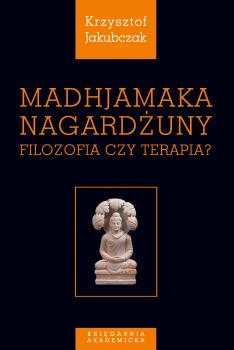Madhjamaka Nagardżuny : filozofia czy terapia?
Synopsis
NĀGĀRJUNA’S MADHYAMAKA: PHILOSOPHY OR THERAPY?
Nāgārjuna was a Buddhist philosopher living in India, in the second century Ce. He gave rise to a philosophical school known later as Madhyamaka or the Middle Way School. My aim in this work was to give a reader the foundations for critical attitude towards multiplicity of opinions about nāgārjuna’s philosophy and, on the other hand, to elucidate a few questions which are notoriously presented in a vague way.
The first aim I carry when discussing the issue of an appropriate research method. The method to study nāgārjuna’s philosophy I propose is an eclectic one. Different cognitive perspectives are combined in it and treated as complementary rather than mu-tually excluding. To accomplish my second objective I consider the question of dialecti-cal nature of Madhyamaka, the narrative structure of nāgārjuna’s texts, the function of tetralemma, and the theory of language, including linguistic realism, meaning, and reference, and also the conception of emptiness, or the way things are.
Chapters
-
TABLE OF CONTENTS
-
Wykaz skrótów .......... 7
-
Zasady cytowania .......... 9
-
Przedmowa .......... 11
-
WPROWADZENIE
-
1. Terapia jako problem filozoficzny .......... 15
-
1.1. Zagadnienie terapii w filozofii Zachodu .......... 15
-
1.2. Terapeutyczność myśli indyjskiej .......... 26
-
1.3. Terapia a filozofia – próba dookreślenia terminów .......... 33
-
1.4. Myśl Zachodu wobec myśli indyjskiej .......... 37
-
2. Nagardżuna i szkoła madhjamaki .......... 39
-
2.1. Historyczny kontekst filozofii Nagardżuny .......... 39
-
2.2. Jak badać filozofię Nagardżuny? .......... 45
-
CZĘŚĆ PIERWSZA. MADHJAMAKA JAKO DIALEKTYKA
-
1. Pojęcie dialektyki a filozofia madhjamaki .......... 57
-
2. Struktura narracyjna tekstów Nagardżuny .......... 62
-
3. Struktura logiczna dialektyki madhjamaki .......... 74
-
3.1. Negacja .......... 74
-
3.2. Tetralemat .......... 86
-
3.3. Zasada niesprzeczności i wyłączonego środka .......... 119
-
4. Teoria języka .......... 132
-
4.1. Natura i funkcja języka .......... 132
-
4.2. Znaczenie i referencja .......... 142
-
4.3. Teoria dwóch prawd .......... 162
-
5. Terapeutyczny charakter dialektyki .......... 165
-
CZĘŚĆ DRUGA. PUSTKA
-
1. Pojęcie samobytu i jego krytyka .......... 173
-
2. Ontologiczne i epistemologiczne aspekty pustki .......... 177
-
3. Terapeutyczny aspekt pustki .......... 181
-
Uwagi końcowe .......... 185
-
Dodatki .......... 193
-
Bibliografia .......... 221
-
Indeks osobowy .......... 239
-
Indeks rzeczowy .......... 245





